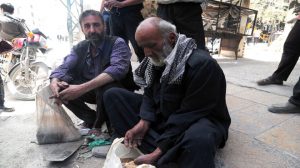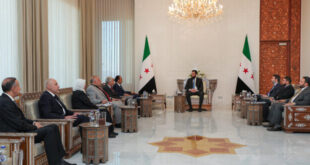Damascus Countryside, SANA-On the pavement of the commercial market near the Grand Mosque of Douma city, Bakri al-Dalati, a farmer, sits beside a bag with a few kilograms of old wheat from last year’s season that he is going to grind in the mill at Khurshid street to prepare bread for his large family.
The farmer, who introduces himself as Abu Ali, is from al-Aab farms on the southern outskirts of Douma. He was forced to leave his land and farm after the terrorists turned it and all Douma’s farms into a battlefield by digging tunnels and trenches and building fortifications and mounds, which they mined in order to block the progress of the Syrian Arab Army.
“We got used to it. There is no water to wash,” says the eighty-year-old farmer to SANA’s correspondent after she drew his attention to the need to purify the wheat grains from impurities before grinding, adding “We are depending on neighbors to get drinking water,” he says.
from impurities before grinding, adding “We are depending on neighbors to get drinking water,” he says.
“The land is the honor,” Abu Ali answered in a low, calm voice a question on whether he misses his farm. “I hope to return as soon as possible,” he said.
The daughters of Abu Ali hold a university degree and have worked in teaching while the three young sons owned professions as blacksmiths, carpenters and farmers. The family maintained a strong relationship between their members.
Dressing in the traditional clothes of Ghouta’s men with a white beard and a face full of wrinkles, Abu Ali recalled the details of his daily life in his farm before he was forcibly displaced along with his family from al-Habit neighborhood of Douma.
“My land extends over an area of 15 sq. m, planted in the winter season with wheat, barley, parsley, onion, radish, lettuce, coriander, beans and peas,” Abu Ali recalls, adding that “by mid-April, I was always shipping a wide variety of crops to the markets of Douma and sometimes to Cham (Damascus).”
Abu Ali wants to return to his land as soon as possible, saying: “Of course I will plant my land as I had always done.”
It was difficult to make Abu Ali smile, but when he was asked if he missed his trees, he did, saying “I miss the walnut and apricot trees… Those trees are just like my kids.”
Manar al-Frieh/Manal
 Syrian Arab News Agency S A N A
Syrian Arab News Agency S A N A

